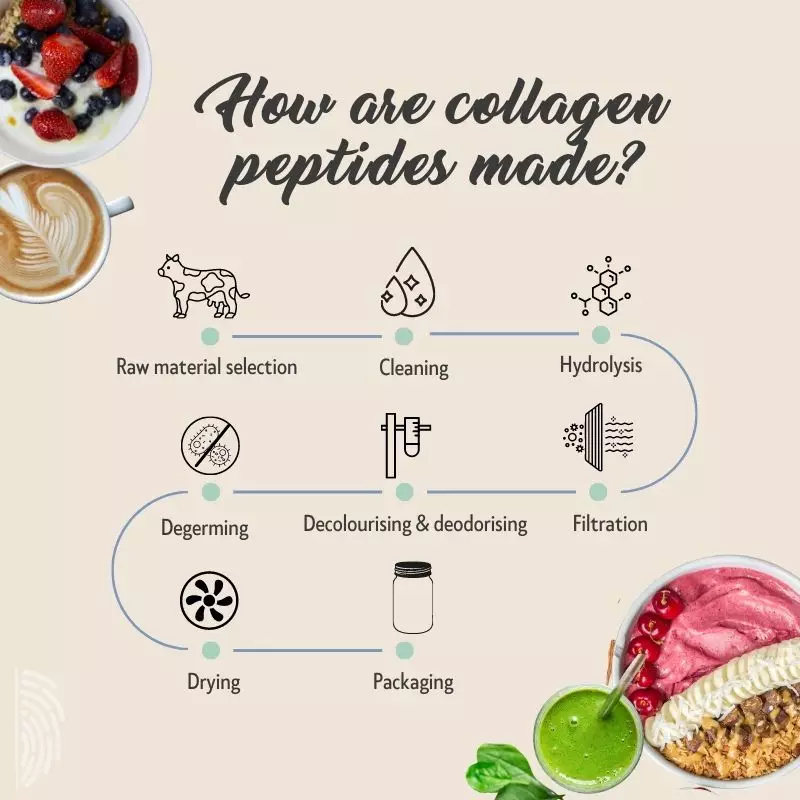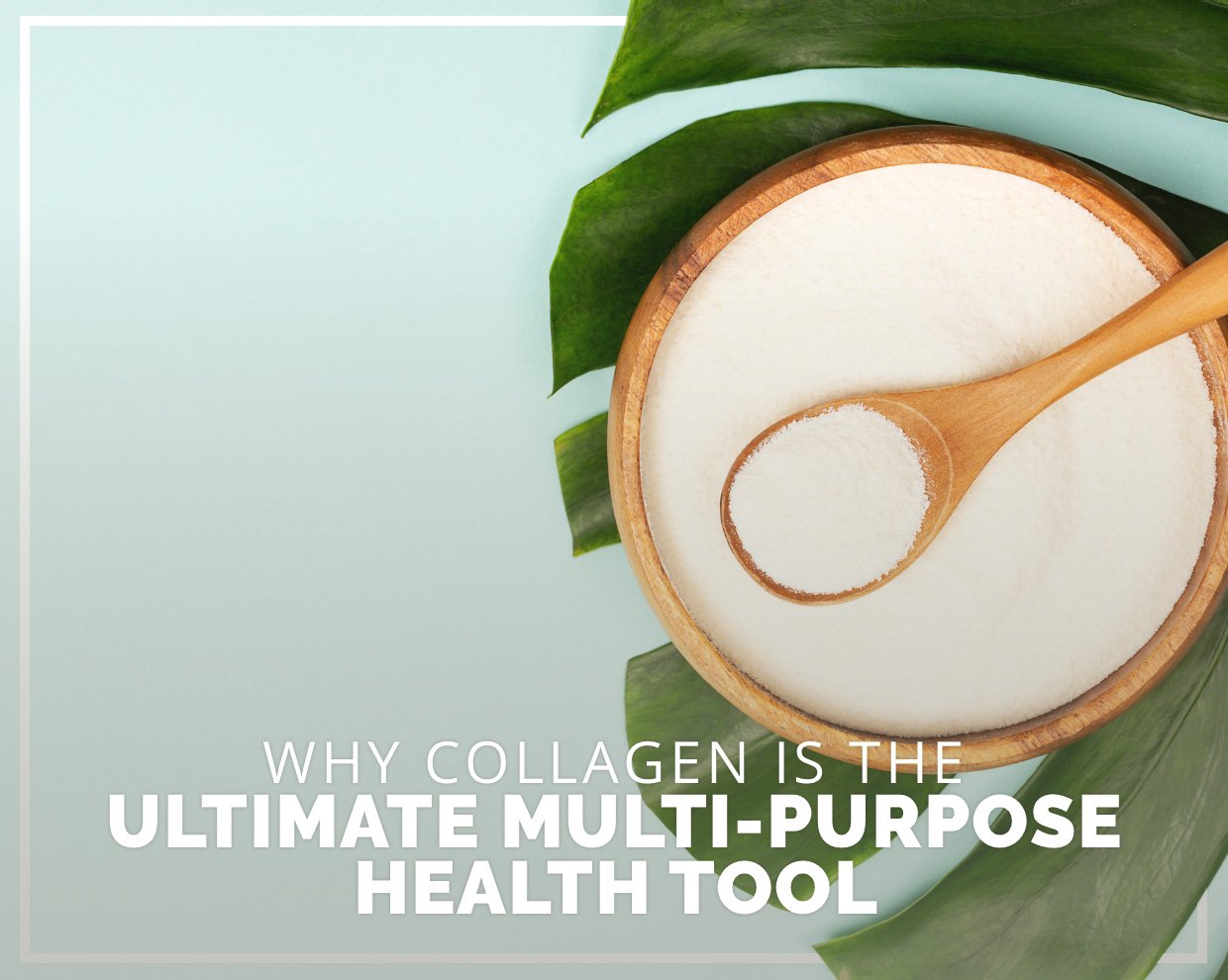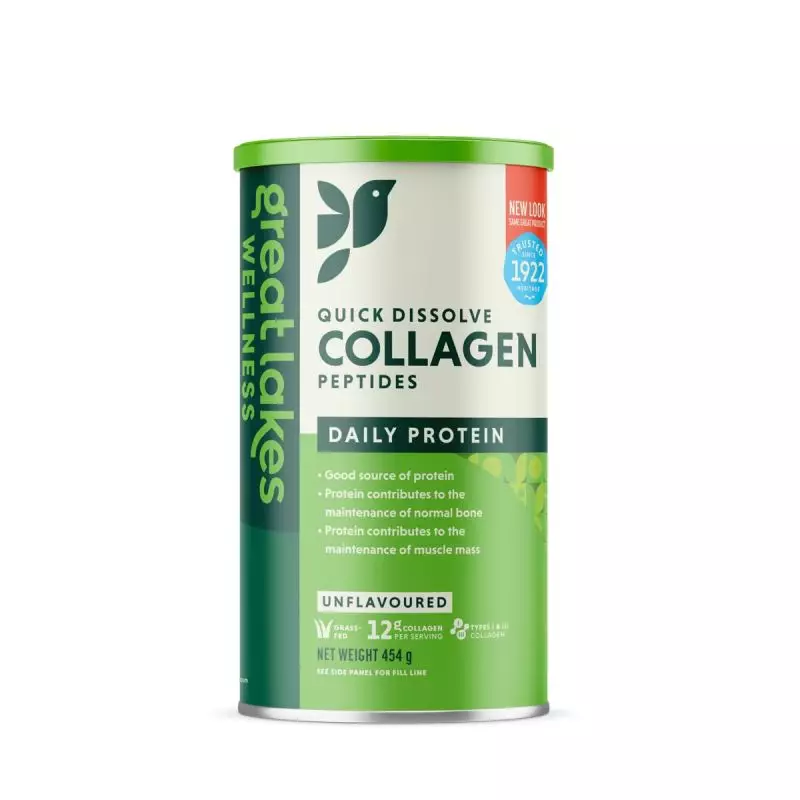Collagen is a fantastic nutritional supplement that has become increasingly accessible across different industries thanks to ever-evolving technologies, techniques and processing methods. Collagen can be found in food, beverages, healthcare, cosmetics, and pharmaceuticals. The global collagen market was valued at USD 9.1 billion in 2022 and is expected to grow at a compound annual growth rate (CAGR) of 10.2% from 2023 to 2030. [1]
One of the reasons why the Functional Self team loves collagen so much is that it is a functional food and multi-purpose health tool. A "functional food" is defined as a nutrient or bioactive compound with health benefits beyond basic nutritional functions. Collagen peptides can be described as having four main levels of functions:
- Nutritional profile: provides amino acids and small peptides.
- Basic functions: improves connective tissues, such as skin, fingernails, ligaments, hair, and bone, to provide structure and elasticity.
- Special biological functions: antioxidant, high water-holding capacity, anti-inflammatory antihypertensive and more. [2]
- Other useful functions: metal chelation, wound healing and forming an edible film. [3]
Collagen is biologically compatible, degradable and weakly allergenic, making it an excellent food source and supplement for the wider population.
This health report aims to answer your most pressing collagen questions and explore how collagen can support your digestive system.
What is collagen powder?
Collagen powder is a dietary supplement made from a type of protein from animal connective tissue. We recommend the hydrolysed form of collagen — where the molecules are broken down into smaller molecules, making them easily digestible, increasing the bioavailability.
Collagen powder is a rich source of proline, glycine and hydroxyproline amino acids. [4] It provides the body with some essential building blocks to support the health of skin, bones, joints, tendons, ligaments and muscles. Collagen is the most abundant protein in the human body.
What are the different types of collagens, and where can you get them?
Collagen exists in many different forms. But did you know the broader collagen superfamily actually consists of 28 types numbered I–XXVIII? [5] The most abundant collagens you'll be more familiar with are types I, II and III.
- Type I: the most common type of collagen – found in skin, teeth, tendons, bones, ligaments, organs and blood vessels.
- Type II: found in cartilage.
- Type III: found in the muscle, skin and blood vessels.
Bovine collagen is made from cows and contains types I and III. Marine-based collagen is made from fish containing type I and II. At Functional Self, we offer both bovine and marine collagen powders so you can adhere to your dietary preferences.


How is collagen powder made?
Manufacturers will use slightly different processes or variations of the steps listed below. In addition, the source of the animal tissues can also vary, impacting the final product's quality and purity.
1) Raw material selection: animal tissues, such as the skin, bones, or cartilage, are carefully selected based on their quality and purity.
2) Cleaning and processing: The tissues are thoroughly cleaned and processed to remove impurities.
3) Hydrolysis: The tissues are then hydrolysed, breaking them down into smaller molecules called peptides.
4) Filtration: The resulting mixture is then filtered to remove any remaining impurities or undigested materials.
5) Decolourising and Deodourising process improves the colour and removes any volatile compounds from the final product.
6) Drying: The filtered collagen solution is then spray-dried or freeze-dried to create a powder.
7) Packaging: The collagen powder is packaged and ready for distribution and consumption.
Do you need collagen in your diet, and how effective is it?
From a young age, we produce collagen endogenously (within our body) for healing/regeneration and forming embryonic tissue. [6] However, our collagen production drastically decreases past the age of 30, and collagen tissues begin to degrade. As a result, we have to rely on exogenous sources from our diet to support healthy ageing, retain a youthful appearance and maintain a robust and resilient body.
The physiological demand for proline is particularly high because it is used for whole-body protein synthesis. It is, therefore, one of the most necessary amino acids in our bodies and is continually required throughout the life cycle. [7]
As a functional food and multi-purpose health tool, collagen has been scientifically proven in the following areas:
1) Skin health
Collagen is a vital protein that is important for maintaining the health of the skin. It provides structure and support, keeping the skin firm and supple. For example, a 2019 randomised, placebo-controlled study found collagen peptides plus vitamins and minerals to significantly improve skin hydration, elasticity, roughness, and density compared to control groups. [8]
Another study from 2018 found that collagen supplements helped increase structural extracellular matrix (ECM) protein synthesis, particularly elastin. It also decreased the synthesis of enzymes that degrade various components of ECM. [9]
2) Joint health, osteoarthritis, and rheumatoid arthritis
The loss of collagen in osteoarticular tissues can significantly diminish the quality of life. It is commonly attributed to hormonal changes, inflammation, immobility, mechanical overload, and joint damage. [10] The latest research in a 2023 literature review found that collagen supplementation effectively increases bone strength, density, and mass; improves joint stiffness/mobility and functionality; and reduces pain. [11]
Osteoarthritis (OA) remains a major public health concern worldwide, with prevalent cases of OA increased globally by 113.25% in nearly 3 decades, doubling from 247.51 million cases in 1990 to 527.81 million cases in 2019. [12] OA occurs when the protective cartilage that cushions the ends of the bones suffers wear and tear over time. A 2013 animal study found type II collagen peptides offered a protective effect on cartilage. [13] In addition, a 2017 study furthered this finding by suggesting the mechanism was through the inhibition of matrix metalloproteinase-13 (MMP-13 protein enzyme) and type II collagen degeneration. [14]
3) Memory and learning
More than 55 million people worldwide suffer from dementia, over 60% of whom live in low-and middle-income countries, and every year, there are nearly 10 million new cases. [15] A protein-rich diet is proposed to help support healthy brain functioning.
In a 2010 study, researchers found collagen may help to relieve memory deficits associated with ageing in rats. [16] A 2019 study in Japan found 5g of collagen administered once a day for 4 weeks was enough to positively affect brain structure and improve language cognitive function. [17]


How does collagen support our digestive systems?
Collagen is a nourishing food source for the digestive system due to its biological compatibility, degradability and weak allergenic properties. Firstly, collagen is rich in the amino acid glycine, which has been shown to help support the growth of beneficial gut bacteria. Glycine may also help reduce inflammation in the gut, improving overall gut health and function.
Secondly, collagen contains other amino acids, such as proline and hydroxyproline, which are important building blocks for the intestinal lining. The intestinal lining acts as a barrier between the gut and the bloodstream, and a healthy intestinal lining is important for preventing harmful bacteria and toxins from entering the bloodstream.
Lastly, collagen may help support the growth of the gut's mucosal layer, a protective layer of mucus that lines the digestive tract. The mucosal layer helps prevent harmful substances from entering the body, allowing nutrients to be absorbed. Let’s take a closer look.
1) The microbiome
A 2021 study found that fish-derived collagen supplementation supported the gut microbiome in obese mice. It led to the colonisation of beneficial bacteria, which suppressed metabolic inflammation and diabetes. [18]
2) Reduce intestinal inflammation
Collagen has been known to 'seal and heal' the gut lining or intestinal barrier. This is especially important with the increasing population suffering from inflammatory bowel disease (IBD). A 2017 study, for example, found collagen peptides may reduce intestinal barrier dysfunction by reducing muscular contraction and supporting tight junction stabilisation and optimal barrier function. [19]
A 2018 review found amino acids improved intestinal barrier functions and expressions of anti-inflammatory cytokines and tight junction proteins. It also decreases oxidative stress and inflammatory molecules. [20] This was supported again, by a 2021 article that found glycine supplementation in particular enhanced the intestinal barrier and reduced inflammation and insulin resistance in obese mice. [21]
3) Bloating
Bloating typically happens when liquid, gas or solids build up in part of your gut. It can also relate to the toxic metabolites formed when the body struggles to digest certain foods. A 2022 clinical trial found 20g of daily collagen peptide supplement was enough to support participants with a reduction in digestive symptoms, which included bloating. [22]
4) Constipation
Constipation frequently occurs in pregnancy, and especially at 3 months postpartum. [23] In a 2017 study, researchers observed the microbial community of the pregnant porcine gut played a critical role in functions that sustain intestinal health. They concluded glutamine supplementation was a valuable remedy for alleviating constipation. [24]
In conclusion, collagen is a versatile and beneficial nutrient that is increasingly available across various industries. It offers several functional benefits, including nutritional, basic and special biological functions, as well as other useful properties such as metal chelation and wound healing. Collagen is the most abundant protein in the human body, and its production declines as we age, making it crucial to obtain from our diet. Collagen powder, which is made through a specific process of hydrolysis, filtration, and drying, is a dietary supplement that can provide essential building blocks to support skin, bone, joint, tendon, ligament, muscle health, digestion and more.
References
[1] Collagen market size, share & trends analysis report by source (bovine, porcine), by product (gelatin), by application (food & beverages, healthcare), by region, and segment forecasts, 2023 – 2030.
[2] Collagen as a source of bioactive peptides: A bioinformatics approach.
[3] Potential health functions of collagen bioactive peptides: A review.
[4] Amino acid composition in determination of collagen origin and assessment of physical factors effects.
[5] The collagen family.
[6] Endogenous synthesis of collagen and its relation to aging: A systematic review. (PDF)
[7] Proline and hydroxyproline metabolism: implications for animal and human nutrition.
[8] A collagen supplement improves skin hydration, elasticity, roughness, and density: results of a randomised, placebo-controlled, blind study.
[9] Effects of collagen-derived bioactive peptides and natural antioxidant compounds on proliferation and matrix protein synthesis by cultured normal human dermal fibroblasts.
[10] Effects of collagen-derived bioactive peptides and natural antioxidant compounds on proliferation and matrix protein synthesis by cultured normal human dermal fibroblasts.
[11] Collagen supplementation in skin and orthopedic diseases: A review of the literature.
[12] https://www.sciencedirect.com/science/article/pii/S2405844023021680
[13] Low dose native type II collagen prevents pain in a rat osteoarthritis model.
[14] Evaluation of the effect of oral administration of collagen peptides on an experimental rat osteoarthritis model.
[15] Dementia.
[16] Marine collagen peptide isolated from Chum Salmon (Oncorhynchus keta) skin facilitates learning and memory in aged C57BL/6J mice.
[17] Effects of collagen hydrolysates on human brain structure and cognitive function: A pilot clinical study.
[18] Diet supplementation with fish-derived extracts suppresses diabetes and modulates intestinal microbiome in a murine model of diet-induced obesity.
[19] Collagen peptides ameliorate intestinal epithelial barrier dysfunction in immunostimulatory Caco-2 cell monolayers via enhancing tight junctions.
[20] Functions and signaling pathways of amino acids in intestinal inflammation.
[21] Dietary supplementation with glycine enhances intestinal mucosal integrity and ameliorates inflammation in C57BL/6J mice with high-fat diet–induced obesity.
[22] Effect of a daily collagen peptide supplement on digestive symptoms in healthy women: 2-phase mixed methods study.
[23] Constipation in pregnancy—prevalence, symptoms, and risk factors.
[24] L-glutamine supplementation alleviates constipation during late gestation of mini sows by modifying the microbiota composition in feces.

 NZ Store
NZ Store  UK Store
UK Store AU Store
AU Store EU Store
EU Store










